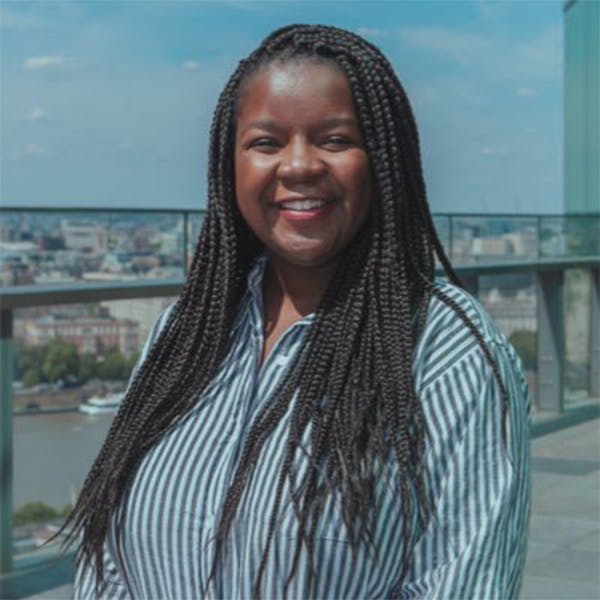
A LETTER TO MY FUTURE SELF
By Mercy Shibemba, award-winning activist, speaker, writer and HIV advocate
To my future self,
I am writing this letter to reflect on my journey growing up with HIV and how it has shaped the person I am today. I’ve already come a long way, from having to hide my HIV status from friends and family as a child to being open about my HIV status today. From feeling disengaged about my HIV care to feeling empowered to take charge of my health. Thanks to advances in HIV treatment and care, I can expect to live a normal life. And while ageing with HIV comes with its own challenges, I hope that by adopting the following four values, I can look forward to a healthy and fulfilling future.

Us as a child, unaware of how our lives will change
Stay curious
As someone born with HIV in the late 90s, I am part of the first generation of children receiving antiretroviral treatment who are now entering adulthood. On the one hand, I already know a lot about HIV and feel well equipped to manage my later years, but on the other, I know there is little data available around the long-term health outcomes of living with HIV when you’ve been on treatment for as long as I have. When I’m in my 80s, I will have been on HIV treatment for 70+ years! Right now, there aren’t any case studies for people like me, leaving many questions unanswered.
Finding answers can be achieved through the continued generation of real-world evidence, a focus for the pharmaceutical industry and the scientific community. I’m hopeful that the data being captured today will help to inform my treatment and care in the future. Meanwhile, I have tried to learn as much as I can through conversations with other people living with HIV from different generations and backgrounds. Through speaking to older women with HIV, for example, I have become aware of the challenges many women can face during menopause. Similarly, speaking to people about the physical and psychological impact of taking treatment for so many years has helped me prepare for the long-term challenges of living with HIV.
I’d encourage my future self to keep building connections within the HIV community and keep asking those burning questions to help prepare me for healthy ageing with HIV. Curiosity is a superpower.
Be open about my HIV status
I’ve been living with HIV openly for six years. When I was younger, I thought HIV would hold me back.
I thought I would never find love or a fulfilling career. I’m proud to say I’ve achieved both of those things – something I would have never dreamed of as a teenager. I now live openly and proudly with HIV, yet I still feel the impact of inherited and internalised stigma. Feeling like I need to hide my HIV status from others has at times impacted my mental health. Having friends with HIV who are navigating the same struggles has been a huge source of comfort and stability for me.
With that said, outdated attitudes to HIV unfortunately still exist. In the future, I would like to focus my advocacy work on educating the general public on what it is like to live with HIV today. Clinicians across different disciplines should also have a solid understanding of how to treat people living with HIV and recognise the structural barriers and systems that prevent people from accessing prevention and treatment services. By starting these conversations and sharing my own story, I hope to one day normalise HIV.
Drive my own health journey
As a teenager, I struggled with taking medication every day. I had never experienced feeling sick or unwell because treatment was always available to me. However, the COVID-19 pandemic led me to prioritise my health and I now find it much easier to take my medication every day. This mindset shift marks the start of my adult journey with HIV. I now feel fortunate to have my HIV under control and will play my part to stay as healthy as possible.
The way HIV is managed has changed so much in recent years. When I was younger, I wasn’t given many options, but now, as an adult, I have a number of different treatments available. I am also starting to consider my own needs and preferences around treatment and how these may change in the future. Making these informed decisions is part of being a good steward of my health.
Plan for the future
I believe health is something that should be invested in. As I get older and consider having children or think about the challenges of going through menopause, it’s important I do everything I can now to protect my health in the future. This involves looking after my body and my mental health. It also involves building and maintaining a good relationship with my healthcare team. Now that I am being treated in an adult unit, I am much more involved in decisions about my HIV treatment and care. I feel that I can have open and honest conversations with my HIV clinician about my hopes for the future. They understand me and my priorities, which ensures my treatment plan is fit for my future self.

Us today, looking forward to what the future holds
Conclusion
So, what does my ideal future look like? I want to start a family, progress in my career and continue to be involved in activism. I hope in 20 years I can read this letter again and say I’ve stayed true
to my values and achieved everything I wanted to do.
How can I get there? By owning my health journey. Not only does this involve prioritising my physical and mental health, but also speaking to people in the HIV community to understand any age-related challenges I may face in the future and continuing to engage in open and honest dialogue with my healthcare team.
A final reminder for my future self is to never underestimate how powerful my story is. Life circumstances and priorities may shift, but there will be many people like me who are navigating similar challenges. Stay authentic and be there to support the next generation of people living with HIV.
Love from Mercy
NP-GBL-HVX-COCO-230021 December 2023
If you get any side effects, talk to your doctor, pharmacist, or nurse. This includes any possible side effects not listed in the package leaflet. You can also report side effects directly via the GSK Reporting Tool link https://gsk.public.reportum.com/. By reporting side effects, you can help provide more information on the safety of this medicine.
If you are from outside the UK, you can report adverse events to GSK/ ViiV by selecting your region and market, here.